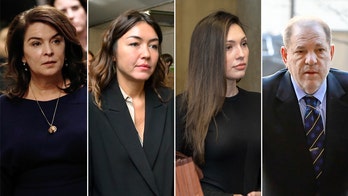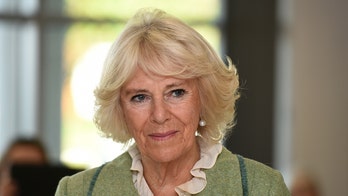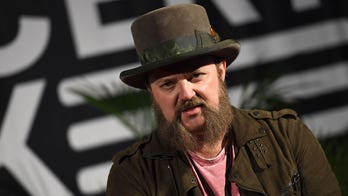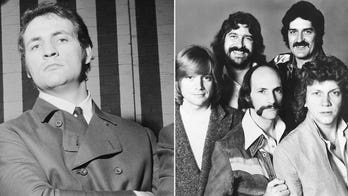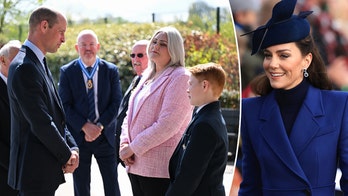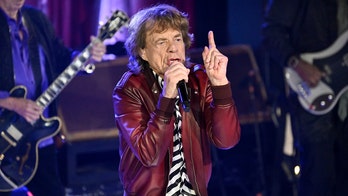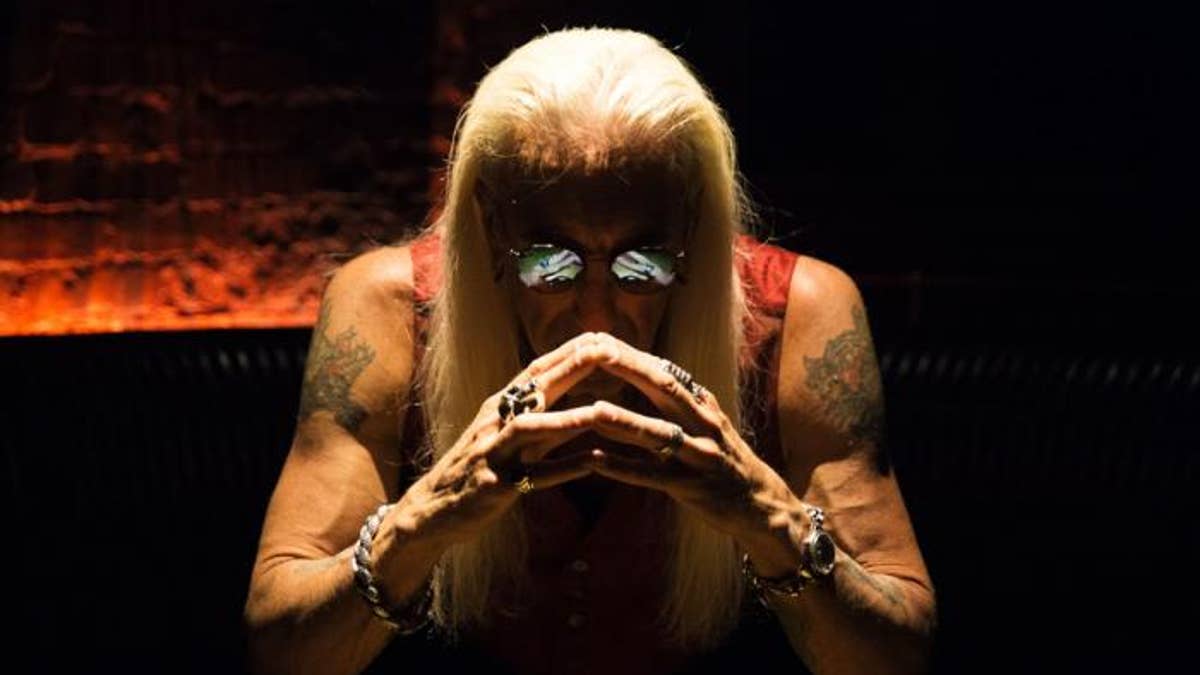
(Tyler Curtis)
When '80s rock group Twisted Sister officially disbanded in 2016, frontman Dee Snider was looking at retirement — until he was challenged to go solo.
And as it turned out, he really did wanna rock.
The 61-year-old is back with a new album titled "We Are the Ones," and longtime fans might be shocked to discover the new musical path Snider is taking. He describes his latest release as having a "contemporary sound," which seems like a far cry from rebellious anthems he sang in pseudo-drag — and the same ones that frightened politicians into having a Senate hearing on whether his message was harmful to children.
But while Snider (who still rocks a head of electric blonde hair) admits that audiences may not instantly embrace his new album, he’s perfectly fine with that. After all, the man practically defined "rebellion" in the mid-'80s, and he’s all too willing to break the rules one more time.
So what’s it like making your mark in today’s music scene after being part an influential group for 40 years? Snider spoke exclusively with Fox News Magazine about "We Are the Ones," and how he imagines his listeners will react to it. Also, he reveals the one gross gift he he never wants from his fans. (Seriously, don’t do it.)
FNM: What prompted you to record a solo album?
DS: I had zero intentions of doing anything new musically. I hadn’t done anything in decades with Twisted Sister or anything else, and I was calling it a day with Twisted Sister. I was moving on. I had a chance meeting with producer/songwriter Damon Ranger on a radio show in Chicago. He essentially challenged me to spread the Dee Snider message to a new audience with contemporary music. I actually dismissed him initially, so I spoke with my wife, who has been my biggest fan and critic for years. She said, "Well, why aren’t you f---ing calling him?" Those were her exact words — she’s from Brooklyn (laughs). I said, "You think I should?" She said, "Uh, yeah moron! Why wouldn’t you?!" I called Damon and he’s like "Wow, I didn’t think you were going to call me back." It just went from there.
FNM: What were some of the challenges of recording an album like "We Are the Ones"?
DS: Many challenges. First of all, new sounds. New level of production. Twisted Sister was a simple rock ‘n’ roll band. You know, like the acronym for KISS: "Keep it simple, stupid." Contemporary pop-rock is much more layered and detailed on its own. There’s also working with new songwriters. My thing was to bring my lyrics, my attitude, my vibe, and inspiration, so that this stuff could suit me, even though it was contemporary. And beyond that, Damon was a real taskmaster.
I’ve never worked harder doing vocals. First day of recording, I showed up in the studio around 3 o’clock. I told my wife on the phone, "You know, [I'll see you] around 7, 7:30? OK babe, I’ll see you later." I hung up and Damon’s like, "What’s 7-7:30?" I tell him its dinner reservations. He tells me, "Cancel your dinner reservations. You’re not going to be home tonight." I’m like, "What?!" I’ve been doing this for so long that I usually just go in and knock it out. But Damon would have me working 8-12 hours in the studio. And even when I would say, "Dude, I’m toast, I can’t sing this same track anymore," he would say, "Good! Let’s move on to the next track because I really want to get that rawness in your voice."
FNM: Even with all your success, you once mentioned in an interview how you wanted to earn your place in the current music scene.
DS: Well, [there are two] options for heritage artists like myself — "heritage," isn’t that a nice word? It’s a nice way of saying old — you either go back to the future, which is making a new album that sounds old, or you go country. Nothing against country music, but I figure leave country to the country people. You don’t see country artists making ‘80s hair metal records. Yet, for some reason, all the '80s artists are going country. There’s also the definition of insanity — doing the same thing over and over, hoping for a different result. To go back to the future and make a new album that sounds old? Why bother? And it’s been proven, the fans don’t care. They just want the old songs from the old bands. This was the challenge that it basically was. If I’m going to do it, I can’t take the easy way out. And if I can’t do that, I need to get the f--- off the stage.
Once I got past the idea that I couldn’t get shorter studio time, I was ready to give it my all. The worst thing for me is regret. I don’t want to live with regret. I did this one album, "Dee Does Broadway," where I rocked out to show tunes. My management was like, "Who’s gonna buy this?" I said, "Probably nobody." I was right. But at the same time, I’m very proud of that record because I wanted to do it and I sang my a-- off. Would I have liked for it to have sold? Yes. But I can walk away from it being proud of that record because I have no regrets in making it. It’s the same thing with this record. I didn’t want to stand among these kids in today’s music and say, "I deserve to be here." I wanted to prove it and earn my place.
FNM: How did the collaboration with Criss Angel happen?
DS: Criss and I have known each other for a long time. We’re both from Long Island. He had contacted me about participating in his charity event to fight children’s cancer. He was asking for a donation, something to auction. I told him, "I recorded this take on 'We’re Not Gonna Take It' and I think you’re gonna want to hear it." I uploaded to him, and five minutes later he called me back and he’s practically in tears, saying, "I gotta have this song as my battle cry." And we went from there. And it’s amazing that this same song that was on the Filthy 15 in 1985 is now presented in a different way and applies to something completely different than its original intent, which was "I hate my father, I hate my teacher, I hate my boss, I hate my peers, I hate everybody." [Criss] did a hell of a great job on that.
The original message of "We’re Not Gonna Take It" got lost with its success. It’s practically a folk song at this point. Everyone all over the world knows it. I think some people don’t even know who wrote it or sang it. They just know the words. But it lost its danger. It’s now a karaoke favorite, it’s in commercials and in movies. But this was about bringing it back and basically punching people in the head with its lyrics. It’s about making people hear the words again. This version, you can’t get away from that.
FNM: Does the parental advisory label matter today?
DS: I don’t think so because it’s so shrunk down. You can barely even see it now. I was looking at iTunes, and keep in mind my eyes aren’t what they used to be, and I’m like, "What the hell is that blemish? Is that dirt on the screen next to three of my songs?" I zoomed in and, oh crap, it’s an explicit warning. I couldn’t even see it! I don’t think the label can keep up with technology.
FNM: Would you have done anything different at that 1985 Senate Hearing?
DS: I’m just thinking … I’m thinking … if I should have worn different jewelry. (Laughs.) [The hearing] was really thought out. I didn’t just walk in there like a friggin’ joke, obviously. I took it very seriously. I worked on that speech for a couple of weeks. I’m very proud of how I handled myself. There’s not one thing I represented, or stood up for, that I haven’t experienced. I’m still married. Tipper and Al Gore aren’t. Ha! And none of my kids have been busted for possession. Just sayin’!
FNM: Speaking of your wife Suzette, I understand she used to do your makeup and pick your wardrobe in the early days.
DS: She did the entire history of the band. She’s still a creative force in my life, always. When I went to do the Criss Angel video, and he was like, "What are you gonna wear, rock-star black?" I said yeah, because you know, I always wear black. But Suzette said "No. I want you wearing white." I said, "White?! I haven’t worn white since I first left the hospital!" She said, "This is a children’s song, this is different. I want white." So she’s still actively grooming me. And she was right, it made a very powerful statement.
FNM: What else has Suzette made you wear that you weren't a big fan of? At least at first?
DS: That was the most recent one, yeah. But back in the early days, I was wearing women’s clothing. One day she tells me at a gig, "Why are you wearing that top?" "I said, "Remember when I told you I loved your top? [And asked] where you got it?" (Laughs.) So she started making me more clothes. I’m talking about garter belts, one-sleeves and booty shorts. So whatever crazy s--- she would come up with, I’d put it on, because, I don’t know. She made it, I’m wearing it.
FNM: You’re known for having loyal fans. What’s the most outrageous encounter you’ve ever had with a fan?
DS: Outrageous for me or for them?
FNM: Let’s do both.
DS: Ha! For me, I can’t really say it’s outrageous, but it’s really the gifts they bring. For some reason, especially back in the ’80s because I posed on the cover of my album with a bloody bone, they figure for some reason I wanted bloody bones. So fans would bring me bloody bones. And I’m like…"Eww! That was a metaphor! You know, stay hungry, I’m like a trapped animal, fighting!" But yeah, they don’t get the metaphor. Nope, they’re like "Look, I brought you a bloody bone!" I’m here just going, "Thank you! I’ll put it with the rest."
But for them … occasionally, people would try to climb over the wall fence of my house back in the day. My response would be to go and get my chainsaw, fire it up, and chase them outside the property. But many people didn’t believe I actually did that. I was on "The Howard Stern Show" once and I started talking about this. One guy called up, "That was me! He’s not lying!" Howard was like, "Oh Jesus, I thought you were making that up." But these people are on my property! I was just protecting myself. With a chainsaw. So yeah, I’m not a good person to stalk. Dee doesn’t do well with stalking. But my wife always says, "That’s how you courted me."
